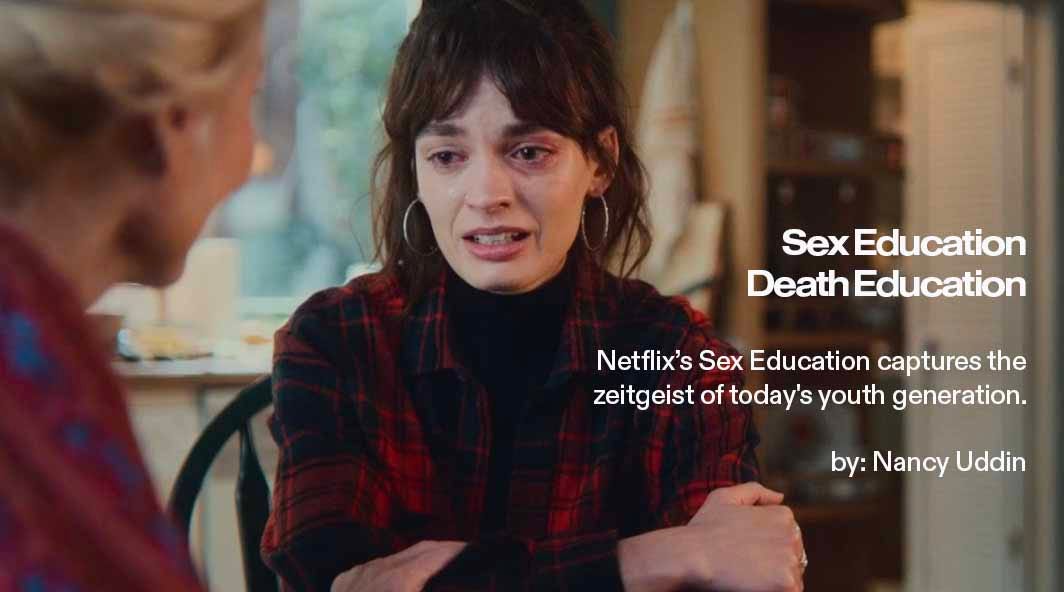Sex Education Introduces Death Education
Netflix’s Sex Education captures the zeitgeist of today's youth generation. My friends and I easily see ourselves in the teenage characters’ deeply personal arcs, from Aimee learning to heal from sexual assault to Eric navigating tension with faith and sexuality.
When co-protagonist Maeve Wiley unexpectedly receives news of her mother’s fatal overdose in the final season, I remembered what it was like for me when I learned my dad had passed. Losing a parent brings a very specific type of grief. When there is a complicated relationship with the parent, the grief becomes even more specific.
Sex Education depicts tragedy in a nuanced and honest light without sensationalizing or romanticizing it. Death education is an effort to normalize the discomfort of the universal truth of dying. I needed to see Maeve’s specific grief shaped by poignant duality, including the overwhelming sadness of the void left behind by a parent's absence and the unexpected relief that can accompany the end of a relationship fraught with childhood trauma.
“It's not uncommon for people to feel relief, particularly when there's childhood trauma,” says Dr. Jean Milburn, a sex therapist and mother to Maeve’s boyfriend.
My father spent his life tunnel-visioned by survivability as he exchanged his time and spirit for money. I resented him for prioritizing work over me and yearned for a functional family. As his mental health slipped throughout the years from unresolved trauma, I found comfort in his absence over his overbearing sad demur that came with his presence.
When my dad flatlined in the hospital, I was consumed by fatherlessness. It became part of my identity. I felt both everything and nothing without self determinism. Yet, I missed him entirely.
“I hate her for everything she put me through, but I miss her with every cell of my being,” says Maeve in her speech at her mother’s funeral.
I felt closer to my dad after his death and understood him more — my father was a marigold and a desert storm at the same time. He was one of the reasons I was here and I loved him despite the complicated history we shared. I grasped that missing him has to coexist with continuing life. This new state catalyzed me to move out of my family’s home, solo travel the world, and begin therapy. I felt my dad’s prayers everywhere as I took greater risks and dedicated myself to personal development. I committed to learning from his life and honoring him by integrating grief.
The Death Positive movement urges people to speak freely about grief and experiences tied to dying or experiencing someone dying. Maeve's spectrum of emotions is a good example of how unique and ubiquitous reacting to death and change is. Beyond simply accepting death, the movement wants people to critically engage with the systems and conditions that lead to deaths resulting from violence, a lack of access to care, and systemic oppression — Maeve’s mother’s death is tied to class struggle. Systemic poverty often traps residents of trailer parks in cycles of drug addiction, making it incredibly challenging for them to access the necessary resources for recovery and rehabilitation.
There is no exact formula to handle losing a loved one, but the lack of healthy media representation isolates people who are grieving even further. Portraying death on television thoughtfully and realistically is a social responsibility. By approaching grief narratives with sensitivity and depth, shows can foster empathy, encourage open discussions, and offer viewers a chance to reflect on mortality. Destigmatizing conversations around death prepare us as a society to proactively navigate the unfamiliar feelings and intricacies we are bound to face — and as Jean says to Maeve, “it is okay to cry, it really is.”
About Nancy Uddin
Nancy Uddin is a Muslim artist based in New York City. She often explores identity, culture, and wellness in her writing. Nancy has bylines in Dazed, Vogue, and HuffPost. She values change, impermanence, and infinite love.






